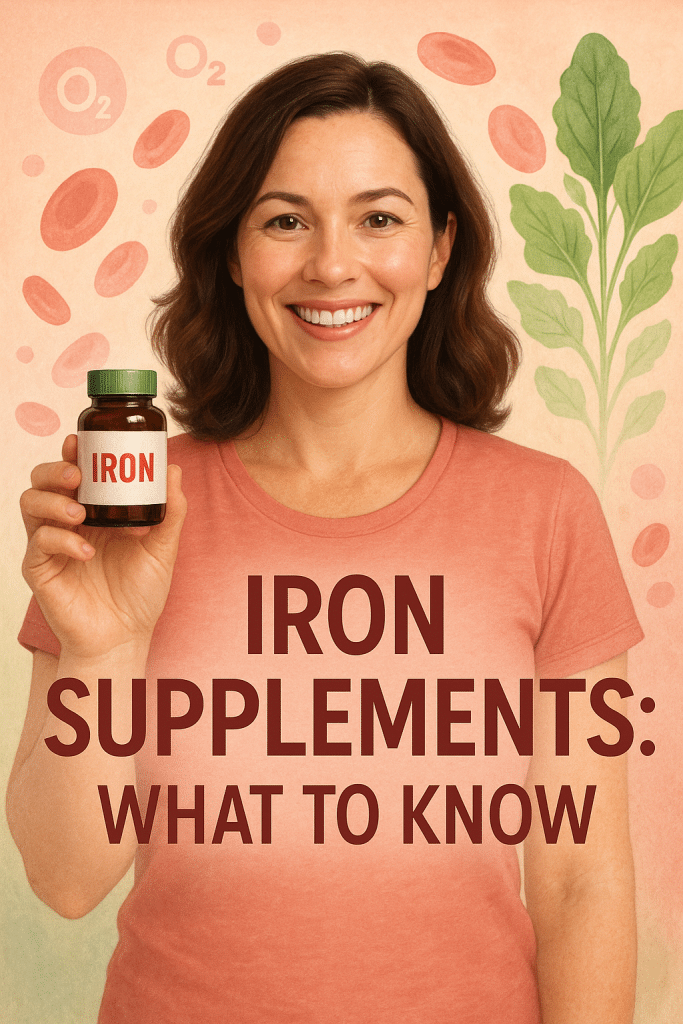Iron deficiency is a widespread concern, particularly among women, who face unique physiological challenges that increase their risk for low iron levels. As someone deeply invested in health and wellness, I understand how vital it is to choose the right iron supplement tailored to your specific needs. Today, I’ll walk you through the best iron supplements for women, drawing from my experience and extensive research. Whether you’re dealing with heavy periods, pregnancy, or just want to maintain your iron levels for enhanced energy and cognitive function, this detailed guide is here to help.
Together, we’ll explore the science behind iron deficiency, nutritional interactions that boost absorption, and dissect the differences between popular iron compounds used in supplements. I’ll provide you with comprehensive reviews of seven top-ranked iron supplements, complete with their unique benefits, ideal usage scenarios, and where to find them. By the end, you’ll be empowered with the knowledge to pick a supplement that fits your lifestyle and health profile perfectly.
Understanding Iron Deficiency and Its Impact on Women
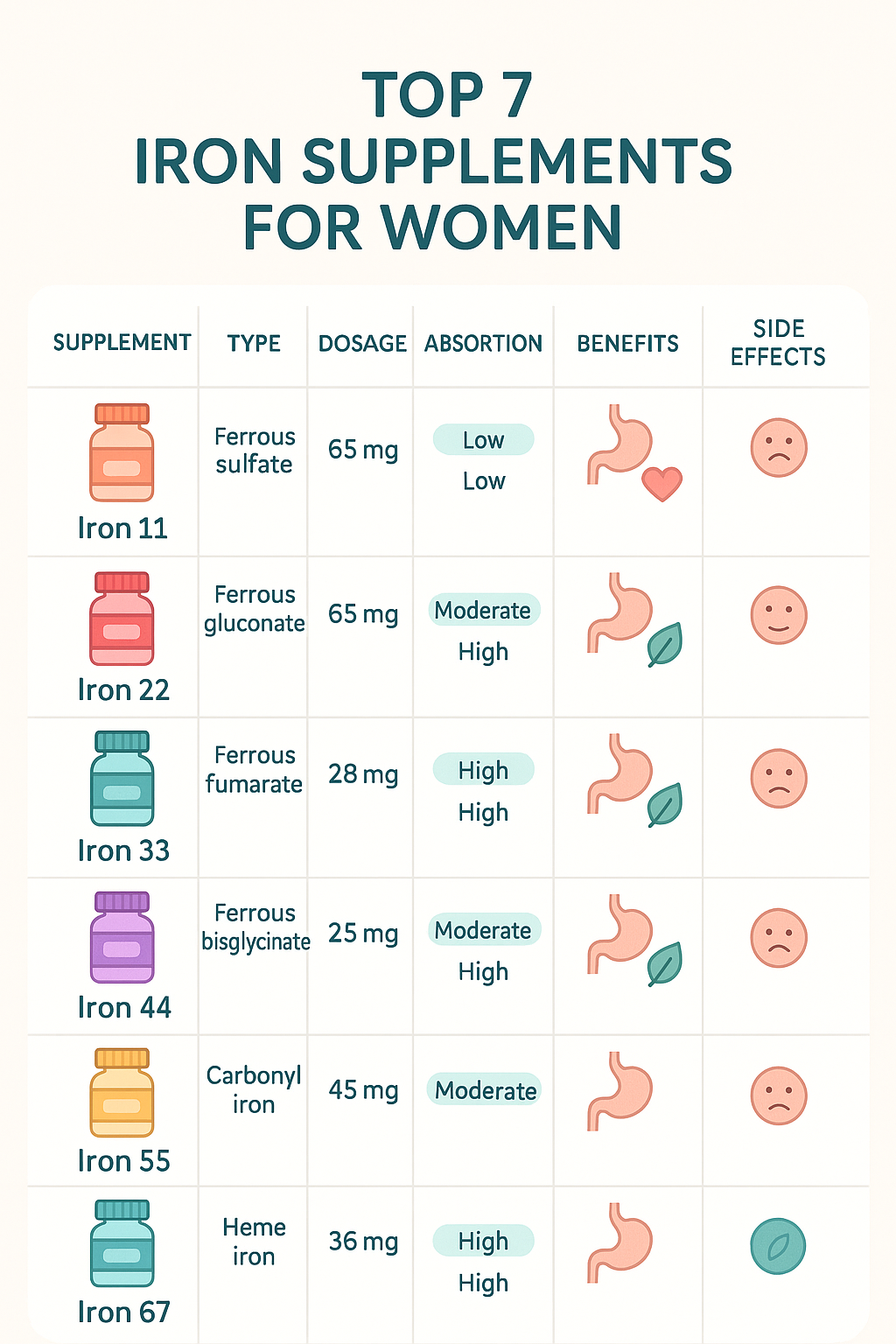
Iron deficiency is one of the most common nutritional deficiencies globally, and it disproportionately affects women compared to men. This is largely due to menstruation, pregnancy, and certain health conditions that increase iron loss or demand.
Common Causes of Iron Deficiency in Women
Iron deficiency in women can arise from several causes:
- Heavy Menstrual Bleeding (Menorrhagia): Women with heavy periods may lose significantly more iron through blood loss, leading to deficiency.
- Pregnancy and Breastfeeding: The iron demand climbs during pregnancy to support the growing fetus and increased blood volume. Breastfeeding mothers also need more iron to replenish stores.
- Poor Dietary Intake: Vegetarians and vegans may not consume enough heme iron (from animal sources), which is better absorbed by the body than non-heme iron from plants.
- Gastrointestinal Disorders: Conditions like celiac disease or inflammatory bowel disease can impair iron absorption.
- Frequent Blood Donation: Regular blood donors can develop iron deficiency if not careful.
Understanding the root cause can help tailor your supplementation strategy effectively.
Symptoms and Health Risks Associated with Low Iron Levels
Low iron manifests not only as fatigue and weakness but also as more subtle symptoms that often go unnoticed:
- Pale skin and brittle nails
- Shortness of breath during activities
- Cognitive difficulties such as poor concentration and memory lapses
- Restless legs syndrome or frequent headaches
- Frequent infections due to weakened immunity
Untreated iron deficiency anemia can severely impair quality of life and lead to complications such as heart issues. It’s essential to identify and address symptoms early with proper supplementation and diet.
Key Nutritional Factors Influencing Iron Absorption
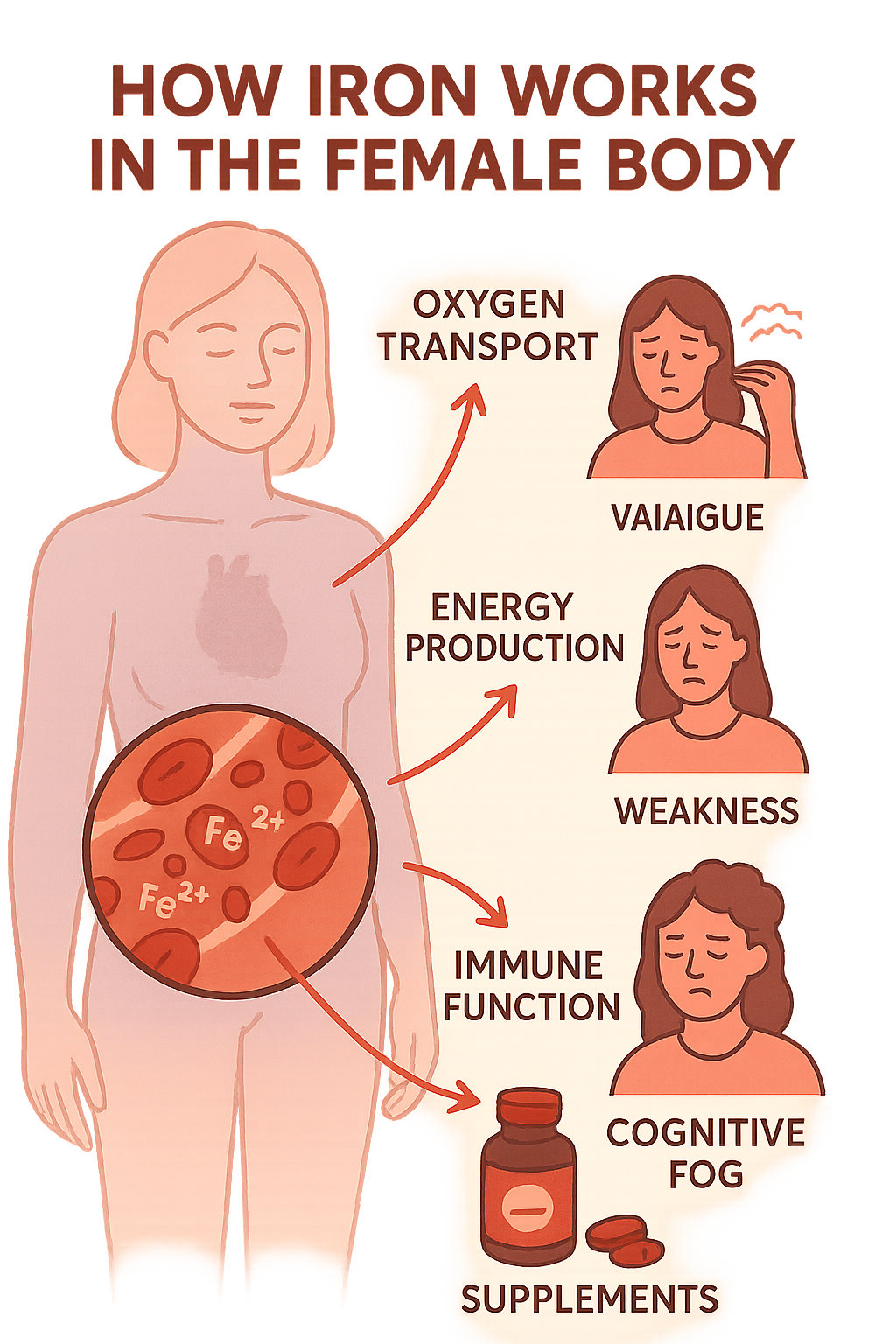
Not all iron supplements are created equal. The bioavailability of iron—the proportion that your body can absorb and use—depends heavily on coexisting nutrients and dietary habits.
Role of Vitamin C, Folate, and Vitamin B12 in Enhancing Iron Uptake
- Vitamin C: A well-known enhancer of non-heme iron absorption, vitamin C converts iron into a form that’s easier for the intestines to absorb. Taking iron with vitamin C-rich foods or supplements can significantly boost its effectiveness.
- Folate (Vitamin B9): Folate supports red blood cell production and works synergistically with iron to prevent anemia.
- Vitamin B12: Vital for healthy nerve function and DNA synthesis, B12 complements iron in maintaining optimal hemoglobin levels and overall blood health.
Many high-quality iron supplements for women include these nutrients to maximize benefits — as we’ll see with Nutricost Iron, which offers a potent trio of iron, vitamin C, folate, and B12.
Inhibitors of Iron Absorption: What to Avoid
On the flip side, several dietary elements can hinder iron absorption:
- Calcium: Often competes with iron for absorption; avoid taking calcium supplements or dairy close to iron supplements.
- Polyphenols and Tannins: Found in tea, coffee, and some grains, these compounds inhibit iron uptake.
- Phytates: Present in legumes, nuts, and whole grains, phytates can bind iron and reduce its bioavailability.
- Certain Medications: Antacids and proton pump inhibitors may interfere with iron absorption.
Being mindful of these inhibitors and timing your supplements away from these substances is a best practice for maximizing iron uptake.
Types of Iron Used in Supplements: Bioavailability and Tolerability
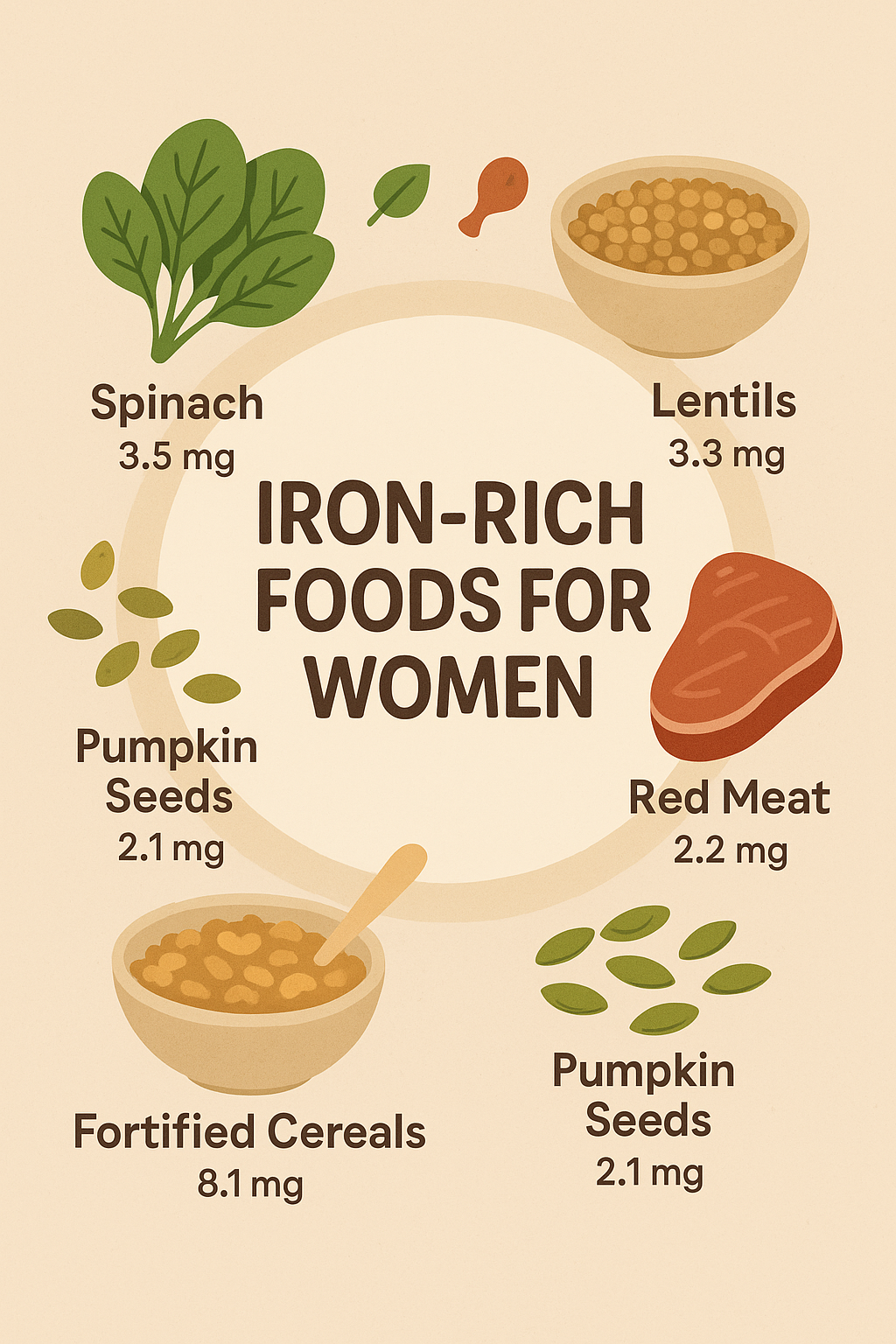
Understanding the chemical form of iron in your supplement is crucial for efficacy and minimizing side effects.
Ferrous Fumarate vs. Ferrous Sulfate: Potency and Side Effects
Both ferrous fumarate and ferrous sulfate are common iron salts used in supplements:
- Ferrous Sulfate: The most widely prescribed form; it has high iron content (typically 20% elemental iron) but can cause gastrointestinal discomfort like nausea, constipation, or stomach cramps in some women.
- Ferrous Fumarate: Contains a slightly higher elemental iron percentage and is considered a bit gentler on the stomach than ferrous sulfate though side effects can still occur.
Nature’s Bounty Iron 65mg tablets use ferrous sulfate and offer a budget-friendly option, but women sensitive to gut issues may want to consider alternatives.
The Benefits of Iron Bisglycinate for Sensitive Stomachs
Iron bisglycinate, a chelated form bound to glycine, offers superior absorption and better tolerability:
- It is less likely to cause gastrointestinal side effects such as constipation or nausea.
- It is recommended for women with sensitive stomachs or those who’ve had trouble with traditional iron salts.
Supplements such as Thorne Iron Bisglycinate and Carlyle Easy Iron utilize this form to optimize both effectiveness and comfort, especially suitable for daily use or during pregnancy.
Slow-Release Iron Formulations: Advantages and Considerations
Slow-release formulations like Slow Fe 45mg are designed to release iron gradually over time, which:
- Reduces gastrointestinal upset by avoiding a high localized concentration of iron in the gut.
- Is convenient for those who experience stomach sensitivity but still need moderate to high doses.
However, slow-release formulas may have variable absorption rates, so they might not be suitable for everyone, especially those needing quick iron restoration.
Comprehensive Reviews of the 7 Best Iron Supplements for Women
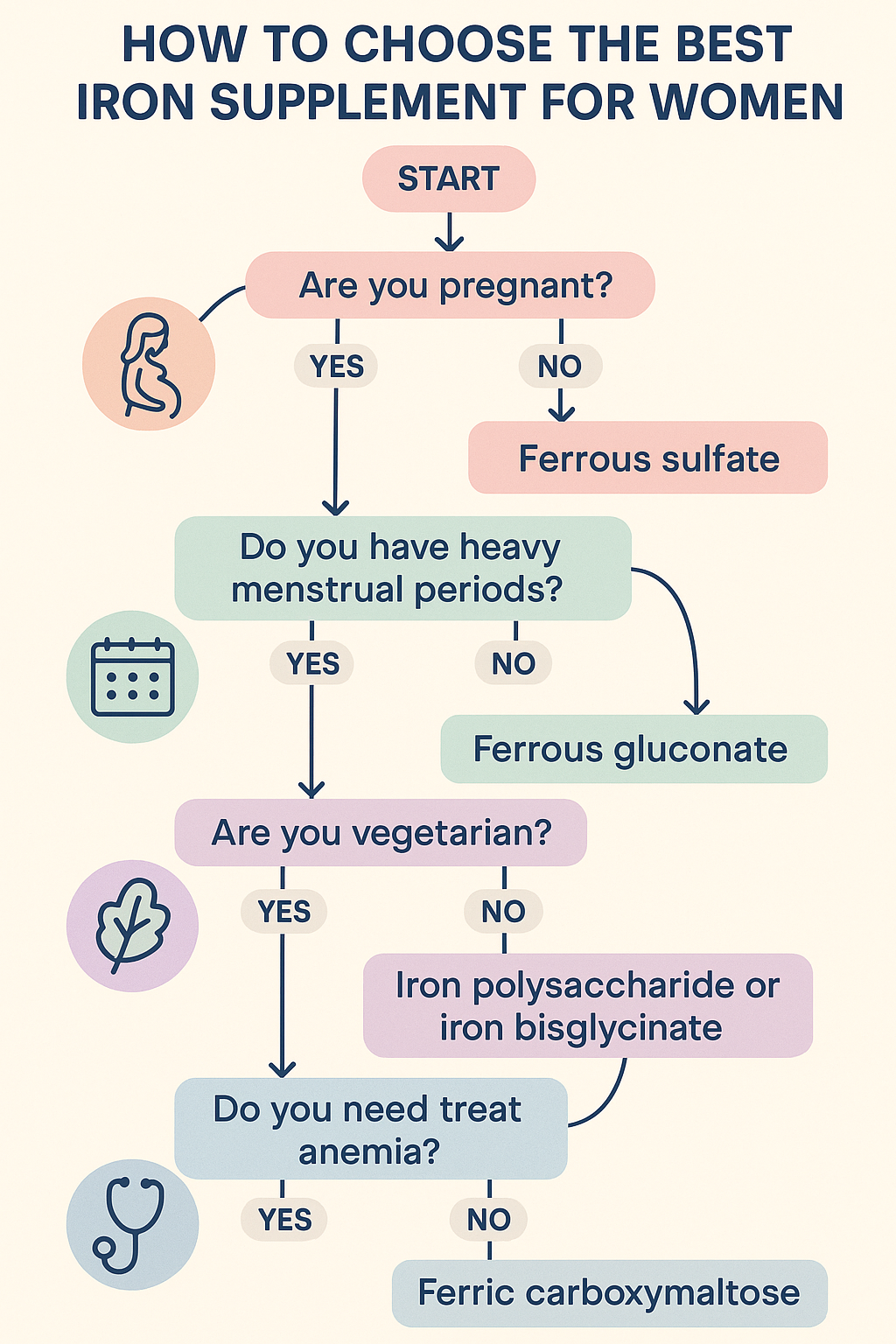
I’ve carefully selected a range of iron supplements based on their formulation, bioavailability, user reviews, and expert recommendations. Here are the seven best options for women, with detailed insights.
Nutricost Iron for Women: High-Dose Iron with Vitamin C, Folate, and B12
Overview: Nutricost Iron for Women offers a potent 65 mg iron dose per capsule, augmented with 45 mg vitamin C, 200 mcg folate, and 600 mcg vitamin B12. This balanced formula is designed not just to replenish iron, but also to support absorption and red blood cell synthesis.
- Best For: Women with heavy menstrual bleeding or pregnancy needs requiring high-dose, well-rounded supplementation.
- Pros: Vegetarian-friendly, non-GMO, gluten-free, and produced in an FDA-registered facility, ensuring quality and safety.
- Use Case: Ideal for women struggling with fatigue and anemia symptoms who need a powerful yet comprehensive supplement.
- Availability: Widely available on Kroger, Target, and HerbsPro.
Why I Recommend It: The inclusion of vitamin C, folate, and B12 in therapeutic doses makes this a strong, complete choice for women needing aggressive support.
Nature’s Bounty Iron 65mg: Affordable and High-Potency Option
- Form: Ferrous sulfate
- Iron Content: 65 mg per tablet
- Pros: Very budget-friendly, widely accessible, and effective for boosting iron levels.
- Cons: Some users report minor gastrointestinal side effects such as constipation.
- Use Case: Suitable for women without sensitive stomachs seeking an affordable, high-potency iron supplement.
- Pricing & Availability: Found at major retailers such as Walgreens, Amazon, and Target.
User Experience: Many women appreciate its effectiveness and value, though those with sensitive digestive systems may want to try other forms.
MegaFood Blood Builder: Food-Based Iron Complex with Minimal Side Effects
This supplement stands out by deriving iron from whole foods like beets and organic oranges, combined with folic acid, B12, and vitamin C.
- Best For: Women seeking a natural, food-based option with minimal side effects.
- Pros: Gentle on the stomach; minimal reports of nausea or constipation.
- Cons: Pricing is higher compared to synthetic iron supplements.
- Availability: Available at Walgreens, Walmart, and other health stores.
My Take: For health-conscious adults who prefer clean-label, food-derived supplements, MegaFood Blood Builder is a standout choice that combines efficacy with tolerability.
Thorne Iron Bisglycinate: Sport-Certified, Gentle Iron Absorption
Thorne’s Iron Bisglycinate provides 25 mg of chelated iron designed for maximum absorption without upsetting the stomach.
- Best For: Athletes, pregnant women, and those with sensitivity to conventional iron supplements.
- Pros: NSF Certified for Sport® ensuring product purity; highly bioavailable and gentle on digestion.
- Cons: Dosage per capsule is lower, so may require multiple capsules depending on need.
- Availability: Sold through Thorne’s website, Amazon, and Walmart.
Expert Insight: The bisglycinate form reduces side effects dramatically, making it a trustworthy option for long-term use and for those needing reliable absorption.
Carlyle Easy Iron: Gentle and Gluten-Free Iron Bisglycinate Supplement
Carlyle Easy Iron offers 28 mg of iron bisglycinate per capsule, emphasizing a non-GMO, gluten-free formula designed for daily use.
- Best For: Women with dietary sensitivities and those seeking a large supply (300 capsules per bottle).
- Pros: Gentle on the stomach, cost-effective for extended use.
- Cons: Lower iron content per capsule means you may take multiple capsules daily.
- Purchase Options: Available on Walmart.
My Recommendation: For women who want to avoid gluten and prefer gentle formulas, Carlyle Easy Iron is an excellent, practical choice.
Slow Fe 45mg Iron Supplement: Slow-Release for Reduced Gastrointestinal Issues
Slow Fe tablets provide 45 mg of elemental iron via slow release of ferrous sulfate, minimizing gut irritation.
- Best For: Women prone to iron supplement-related nausea or stomach upset.
- Pros: Slow release eases digestive discomfort while delivering a moderate dose of iron.
- Cons: Slower absorption may not be ideal for severe anemia cases.
- Where to Buy: Retailers include Amazon, Walgreens, and Kroger.
Use Case: A solid choice for those who need to reduce gastrointestinal side effects without sacrificing dosage strength.
Nature Made Iron 65mg: USP Verified High-Quality Iron Supplement
Nature Made Iron 65 mg tablets are USP verified, ensuring quality and safety, with a well-known reputation.
- Best For: Women seeking reliable, quality-certified iron supplementation.
- Pros: USP verification ensures potency and purity; widely accessible; good price point.
- Cons: May cause mild digestive symptoms in sensitive users.
- Where to Find: Available at Nature Made, Target, Amazon, and wholesale retailers like Costco.
Why It’s Worth It: A trusted brand that fits a broad audience looking for a straightforward, effective iron supplement.
Choosing the Right Iron Supplement Based on Your Lifestyle and Health
Choosing the ideal iron supplement goes beyond just the dosage. It hinges on your personal health profile, dietary preferences, and lifestyle.
Iron Supplements for Women with Sensitive Stomachs and Specific Conditions
If you have a history of gastrointestinal upset or sensitive digestion, iron bisglycinate forms (Thorne, Carlyle Easy Iron) and slow-release options (Slow Fe) are your best bets. These formulations substantially reduce side effects while maintaining efficacy.
Budget-Friendly vs. Premium Iron Supplement Options
- Budget-Friendly: Nature’s Bounty Iron 65mg and Nature Made Iron 65mg provide value for money with solid iron content.
- Premium/Functional: Nutricost Iron for Women and MegaFood Blood Builder include additional supportive nutrients and are formulated for enhanced absorption and tolerability.
Iron Supplementation During Pregnancy, Breastfeeding, and After 40
Women in pregnancy and breastfeeding stages require increased iron and usually benefit from supplements like Nutricost Iron or Thorne Iron Bisglycinate that provide balanced nutrient support with gentle absorption profiles.
Women over 40 may face decreased absorption or dietary intake, making slow-release options or bisglycinate forms suitable based on tolerance and individual needs.
Best Practices for Taking Iron Supplements to Maximize Benefits
Timing, Dosage, and Dietary Tips to Enhance Iron Absorption
- Take iron supplements on an empty stomach for best absorption, but if stomach upset occurs, taking with a small amount of food is okay.
- Avoid tea, coffee, calcium-rich foods, and antacids within two hours of taking iron.
- Pair iron intake with vitamin C-rich foods or supplements for enhanced absorption.
- Follow the dosage recommended by your healthcare provider; self-dosing can lead to overload or toxicity.
Managing and Minimizing Potential Side Effects
- Start with a lower dose and gradually increase to reduce nausea.
- Stay hydrated and maintain a diet rich in fiber to prevent constipation.
- Consider switching to a gentler iron form if side effects persist.
Monitoring Iron Levels and Knowing When to Seek Medical Advice
Importance of Blood Tests and Professional Guidance
Regular blood tests, including ferritin, hemoglobin, and hematocrit levels, guide supplementation needs and prevent excess intake. Always consult your healthcare provider before initiating any iron supplement, especially if you’re pregnant or have underlying health conditions.
Risks of Iron Overload and How to Avoid Them
Excess iron accumulation can cause organ damage and increase infection risks. Avoid self-prescribing high-dose iron supplements long-term without lab monitoring, and never exceed recommended dosages.
Unique Insight: Personalized Iron Supplementation – Tailoring Your Choice to Genetic and Lifestyle Factors
Emerging Research on Genetic Variants Affecting Iron Metabolism in Women
Genetic variations influence how efficiently your body absorbs and utilizes iron. For instance, some women have polymorphisms that impair iron absorption or increase loss, requiring tailored dosing.
Utilizing Personalized Nutrition for Optimal Iron Status
Advanced testing and consultation with a nutrition expert can help determine your individual needs and the best supplement form, ushering in a new era of personalized, effective iron supplementation.
Conclusion: Empowering Health-Conscious Women with Trusted Iron Supplement Options
Choosing the best iron supplements for women is a pivotal step towards optimizing energy, cognitive function, and overall wellness. By understanding iron deficiency, knowing what enhances or inhibits absorption, and evaluating different iron forms, you’re well on your way to making a smart choice. Whether seeking high-dose support during pregnancy or gentle daily maintenance, the seven supplements we’ve discussed offer trusted solutions to meet diverse needs.
Remember, pairing supplementation with professional guidance through blood testing and lifestyle adjustments is key to success. Don’t let iron deficiency hold you back—empower yourself with knowledge and the right iron supplement to thrive every day.
If you’re ready to take the next step, consider your specific health needs and explore the options above. Your vibrant health is worth it!
FAQs
1. What is the best iron supplement for women with heavy periods?
For women experiencing heavy menstrual bleeding, Nutricost Iron for Women is an excellent choice due to its high 65mg elemental iron dose combined with vitamin C, folate, and B12 which aid in absorption and support recovery.
2. Are there iron supplements for pregnant women that don’t cause constipation?
Yes. Thorne Iron Bisglycinate and MegaFood Blood Builder are gentle, well-tolerated supplements designed to minimize gastrointestinal side effects while meeting pregnancy iron demands.
3. Which iron supplements are easiest to absorb for women with sensitive stomachs?
Chelated iron bisglycinate supplements such as Carlyle Easy Iron and Thorne Iron Bisglycinate offer superior absorption with fewer digestive issues.
4. How can I improve iron absorption while taking supplements?
Taking your iron supplement with vitamin C-rich foods, avoiding tea, coffee, and calcium near dosing, and following your healthcare provider’s guidance can significantly improve absorption.
5. What are signs I should see a doctor about my iron levels?
If you experience persistent fatigue, pale skin, shortness of breath, or symptoms of anemia despite supplementation, or if you suspect iron overload, consult a healthcare professional for proper testing and management.
Quick Takeaways/Key Points
- Women are at higher risk for iron deficiency due to unique physiological factors like menstruation and pregnancy.
- Vitamin C, folate, and B12 enhance iron absorption and red blood cell production.
- Chelated iron bisglycinate is generally better tolerated than ferrous sulfate or fumarate.
- Slow-release iron formulations reduce gastrointestinal side effects but may absorb differently.
- Nutricost Iron for Women provides a potent, comprehensive formula ideal for heavy periods and pregnancy.
- Budget options like Nature’s Bounty and Nature Made offer effective, reliable iron but may cause mild gut issues.
- Personalized approaches considering genetics, lifestyle, and tolerance lead to optimal supplementation outcomes.
Empower your health journey today by choosing a trusted iron supplement tailored to your needs!

